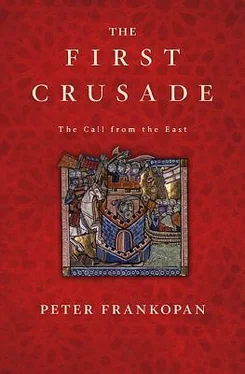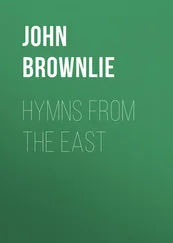Had the emperor done so, he might well have unblocked the impasse that stymied the progress of the Crusade. He might also have avoided the hostility towards him that was quickly building up. Some weeks after the capture of Antioch, Peter Bartholomew, who had identified the location of the Holy Lance, started having more visions. This time St Andrew was telling him that the Byzantines should not take possession of Antioch, for if they did so, they would desecrate it, as they had supposedly done with Nicaea. 57Attitudes towards Alexios and Byzantium were becoming poisonous.
In the circumstances it did not help that Adhemar of Le Puy had died of fever on 1 August 1098. The bishop had not only been the Pope’s envoy during the expedition, but had gained the respect of the other leaders and the lower-ranking men with his unstinting bravery. His obvious delight at being sent seventy Turkish heads by Tancred increased his popularity. 58The Chanson d’Antioche , a poetic song recording the glory of the First Crusade, also described how Adhemar shared the excitement of a crowd as it watched knights devouring the flesh of dead Turks and washing it down with wine. 59
In the emperor’s absence, the bishop might have been able to soothe tensions in the Crusader camp, as he had done at a low point during the siege when his suggestions on how to appease God’s wrath had been acted upon. 60As the Pope’s representative, Le Puy was the bridge between east and west, ‘ruler and shepherd’ of the Crusader army, and a calming influence. Adhemar, ‘beloved by God and mankind, flawless in the estimation of all’, died at precisely the wrong moment. 61
On 11 September 1098 a letter was sent to Pope Urban II in the names of the expedition’s senior figures, including Bohemond, Raymond of Toulouse, Godfrey of Bouillon, Robert of Flanders and Robert of Normandy. While the Turks and the pagans had been subdued, the letter reported, it had been impossible to overcome the heretics: Armenians, Jacobites, Syrians – and also the Greeks. 62
This was a key moment in the Crusade. Giving up on the emperor, the western leaders turned to the Pope for leadership, imploring him to join them in the east. ‘In this way, you will complete the expedition of Jesus Christ which we began and you preached. Thus you will open the gates of both Jerusalems, liberate the Sepulchre of the Lord and exalt the Christian name over every other one. If you do come to us to complete with us the expedition you began, the whole world will obey you ... Amen.’ 63
In its final paragraph, the letter went even further: the emperor was not only rebuked for not having done enough to help the expedition, he was also accused of having actively sought to harm the campaign. ‘You should separate [us]’, the leaders wrote, ‘from the unjust emperor who has never fulfilled the many promises he has made us. In fact, he has hindered and harmed us in every way at his disposal.’ 64The Pope, however, was no more willing than Alexios to join the expedition. He instead sent a high-ranking cleric, Daimbert of Pisa, to replace Adhemar.
In the meantime, little progress was made at Antioch. In the months that followed the capture of the city, Bohemond played a truculent game, trying to provoke Raymond wherever possible in order to get his own way. When the Count of Toulouse moved against Maarrat an-Numan, Bohemond raced to the town to prevent him from taking it and using it to secure the wider region for himself. When the town finally fell after a long and difficult siege, the Norman then brazenly occupied parts of Maarrat, refusing to hand these over to Raymond, in order to gain leverage in Antioch.
Efforts to mediate between the two Crusaders ended in failure. Meeting in the Basilica of St Peter in Antioch, Raymond solemnly repeated the oath to Alexios, stressing that the commitment could not be rescinded on a whim. In response, Bohemond produced a copy of the agreement made between the leaders before the storming of Antioch, noting that this too was binding. The Count of Toulouse again emphasised that ‘we swore upon the Cross of the Lord, the crown of thorns and many holy relics that we would not hold without the consent of the emperor any city or castle in his dominion’. 65He offered to submit to the judgement of his peers, specifically Godfrey of Bouillon, Robert of Flanders and Robert of Normandy – on the condition that Bohemond would travel on with them to Jerusalem. He was prepared to compromise, in other words, as long as the issue was resolved later. 66
This sounded reasonable enough – but many could see both sides of the argument. The oaths had been clear and categorical; and yet it seemed that Alexios had not kept his side of the agreement. As impatience grew within the Crusader army, Bohemond realised that his best bet was to sit tight. Eventually, his intransigence paid off. At the start of 1099, Raymond of Toulouse finally gave up trying to resist Bohemond’s demands and prepared to set off for Jerusalem without him.
Yet the other leaders had learnt from Bohemond, and demanded concessions from the wealthy count of Toulouse in return for continuing on their journey. As substantial payments of 10,000 solidi to Godfrey of Bouillon and Robert of Normandy, 6,000 to Robert of Flanders and 5,000 to Tancred show, they had learnt that their co-operation to make the final move to Jerusalem could have a price. The idealism that had characterised the expedition at its outset had been replaced by something altogether more pragmatic: upfront payments for marching to the Holy Land, unilateral declarations that sworn oaths no longer applied – and if not the jettisoning of spiritual incentives, then at least the demand for material benefits alongside them. The expedition had taken on a decidedly new dimension since the capture of Antioch. 67
There were further difficulties during the journey to Jerusalem. The capture of Maarrat an-Numan over the winter of 1098–9 was followed by deprivation that was worse than even the terrible scenes at Antioch twelve months earlier. Starved and weakened and with few taboos still to break, the Crusaders were so desperate that they reportedly cut the flesh from the buttocks of dead Muslims and ate them. And so acute was the hunger that many tried to eat the human flesh even before it had been properly cooked. 68
Local rulers controlling territory on the route to Jerusalem anxiously made truces with the western army as it approached, having heard how the Crusaders had dealt with the armies of Duqaq, Ridwan and Kerbogha, and after receiving gory reports about their cruelty in places like Maarrat where captives’ stomachs were sliced open in the belief that they had swallowed gold coins to keep them hidden. The emirs of Shaizar, Homs, Jabala and Tripoli, for example, sent lavish gifts to Raymond of Toulouse to win his goodwill and prevent attacks on their towns. 69
Progress slowed dramatically when the army reached Arqa, and subjected the town to a siege that dragged on for three months. By this time, Alexios had learnt of the Crusaders’ survival at Antioch – and of the change in attitude towards him. He dispatched ambassadors to complain about the flagrant violations of the oaths when he found out about their refusal to restore Antioch and other former Byzantine possessions to him. The envoys now advised the western leaders that the emperor would join the expedition on 24 June 1099 and that the Crusaders should therefore hold position and wait for him. This caused debate within the western army, with a divide quickly emerging between those who welcomed the arrival of Alexios and of reinforcements, and those who were no longer willing to co-operate with the Byzantines. Even the promise of substantial gifts, suggested by the ambassadors, had little impact on those who had now sided against the emperor. 70
Читать дальше











